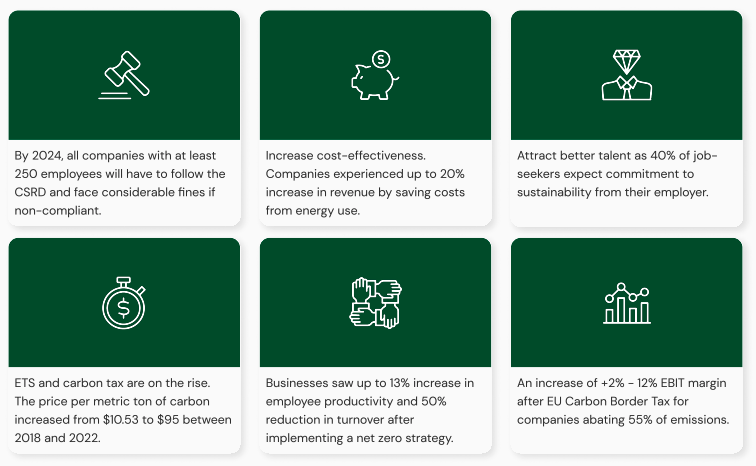Corporate Social Responsibility (CSR) refers to a company or organisation's commitment to operating in a sustainable and ethical manner, whilst simultaneously addressing the needs of its stakeholders and society. Foundational upon the idea that a business has a responsibility to the society that exists around it, CSR can be seen as a form of self-regulation businesses take on through the expression of sustainable initiatives and strategies. While different organisations display different forms of ‘social responsibility’, companies are often guided by the ‘triple bottom line’. The triple bottom line dictates that businesses should be committed to channelling their efforts towards profit, people, and the planet.
In today’s rapidly changing business environment, CSR has quickly emerged as a must-know term used to describe a company’s ethical, social, and environmental responsibilities. The exponential growth of this term reflects the immense growing pressure companies are facing from internal and external stakeholders to extend their strategy beyond profit-making towards a strategy that positively contributes to society and the environment. As such, businesses are realising that CSR is quickly becoming a must-have, rather than a nice-to-have. Accordingly, this comprehensive article will delve into the definition of CSR, the benefits of CSR for businesses, CSR implementation strategies, and the key role CSR plays in shaping a sustainable future.
The fundamentals of Corporate Social Responsibility in business
All CSR strategies generally involve prioritising environmental and social concerns within a businesses key operational and decision-making processes; however, there are various levels of responsibility that business leaders must consider when developing a CSR strategy. Here are the fundamentals you should be looking for:
- Environmental: Environmental responsibility is a vital pillar of CSR, and entails minimising a company’s negative impact on the environment via the adoption of sustainable practices. At the heart of integrating environmental factors into a company’s strategy is implementing CSR initiatives focusing on the reduction of greenhouse gas emissions (GHG), such as carbon dioxide (CO2). For example, a key CSR environmental initiative which businesses often implement involves utilising sustainability software to identify inefficiencies in energy usage. Businesses can then improve their energy efficiency and reduce waste through actions such as going digital. Businesses who prioritise the environment via the implementation of decarbonisation strategies will ultimately reap the long term financial and non-financial benefits of sustainability.
- Social: Social responsibility is a fundamental component of any effective CSR strategy, and involves placing a key focus upon the wellbeing of employees, communities, and society. For example, businesses may exert a focus upon the social aspect of CSR through ensuring that diversity, equity and inclusion is a key consideration within all recruitment and training processes; thus ensuring a safe(r) workplace for all individuals. Companies who strive to translate their social responsibility into real action should prioritise the implementation of CSR initiatives that ensure fair labour practices, maximise workplace safety, support diversity and inclusion, foster employee development, and actively contribute to community initiatives.
- Ethical: Ethical responsibility is a key component of CSR, and it revolves around ensuring that all business activities are ethical and transparent. Companies express their ethical responsibility through channelling their efforts towards CSR practices that guarantee they adhere to laws and regulations, promote honesty and integrity in their business practices, strengthen human rights throughout their supply chain, and combat corruption. For instance, companies may seek expert guidance from a third party regarding the latest ESG and sustainability regulations influencing their operations, thus ensuring they can take proactive action to stay ahead of the curve.
The 5 key benefits of CSR for businesses
Resource efficiency and cost savings
The implementation of a CSR strategy is fundamental to maximising resource efficiency. Businesses that identify and implement measures to enhance operational efficiency, minimise energy consumption, and reduce waste generation hold the opportunity to ascertain substantial cost savings through lower energy bills, reduced raw material usage, and optimised supply chain operations. For instance, research by McKinsey highlighted a 60% potential improvement in operating profits via the reduction of resource costs.
Regulatory compliance
Businesses who implement a balanced CSR strategy will ensure they can not only ensure compliance, but also stay ahead of evolving regulations. Businesses that take a proactive approach towards meeting changing social and environmental standards will ultimately mitigate the immense risks associated with environmental, social, and governance (ESG) regulations - such as facing financial penalties and legal issues. Accordingly, high to severe ESG incidents have been found to lead to 6% loss of market capitalisation on average.
Investor and stakeholder expectations
Oxford University found that more than 80% of mainstream investors now consider ‘ESG’ information when making investment decisions, and they often prefer to invest in companies with robust sustainability practices. As such, companies who aim to continuously bolster their CSR efforts will attract a broader range of investors and access capital more easily. Meanwhile, by actively engaging with stakeholders - such as employees, customers, investors, and communities - companies can build stronger and more collaborative relationships. This facilitates increased loyalty, support, and long-term partnerships.
Enhanced brand reputation
Companies that prioritise CSR will not only mitigate the risk of reputational damage, but also often improvements in consumer trust and brand reputation. By demonstrating a commitment to social and environmental issues, businesses can differentiate themselves and build stronger connections with customers who value responsible practices. Such engagement will deliver an increase in sales due to an increase in customer loyalty and satisfaction; with findings highlighting up to a 60% increase in customer commitment
Talent attraction and retention
A comprehensive approach to CSR can attract and retain top talent by showcasing a company's commitment to increasingly-prioritised values. With findings showing that 67% of millennials expect the companies they work for to be purpose-driven and their jobs to have a societal impact; employees are more likely to be engaged and motivated when they work for an organisation that aligns with their personal beliefs and contributes positively to society. As such, companies who exert their commitment to CSR via the implementation of a comprehensive sustainability strategy have been found to realise up to a 13% increase in employee productivity, and up to a 50% reduction in turnover.

How to implement a CSR strategy
While CSR is absolutely vital to building a more sustainable future, it is just as critical to building a future-proof business. Businesses who implement an aligned CSR strategy will hold the potential to mitigate vast levels of risk, whilst leveraging an array of cost-saving benefits in order to ascertain a long-term competitive advantage. In order to ensure the efficient and effective implementation of a CSR strategy, businesses must:
Set clear objectives and targets
As a first step, businesses who wish to reap the long term benefits of CSR and sustainability must establish measurable goals that align with the company's values and the expectations of stakeholders. These objectives should be specific, attainable, and time-bound to provide a clear direction for sustainability and CSR practices.
Integrate environmental and social concerns into core business practices
Subsequently, businesses must ensure that they integrate CSR concerns into the company's overall strategy and operations. This involves company’s embedding CSR principles into decision-making processes, supply chain management, product development, and corporate governance. For instance, an increasingly mandatory CSR initiative that companies are undertaking is the collection and monitoring of operational data across the wider supply chain for inclusion in sustainability reports, carbon footprint reduction, and to identify supply chain risks.
Pursue alignment between stakeholders
CSR initiatives require clear, consistent communication with various stakeholders - such as employees, customers, investors, communities and the environment. Involving stakeholders in CSR communications and decision-making processes fosters collaboration, enables diverse perspectives, and ensures that CSR initiatives address relevant issues. Meanwhile, regular communication and feedback loops enable companies to understand stakeholder expectations and make informed decisions.
Read here for a comprehensive guide to managing stakeholders in the net-zero transition.
Leverage the power of sustainability technology to monitor, report and improve upon sustainability performance
Companies should establish robust monitoring systems to track performance on CSR, evaluate outcomes, and identify areas for improvement. Sustainability leaders that ensure that organisation wide and value-chain wide sustainability assessments are periodically undertaken, and that sustainability performance data is rigorously measured and analysed will be able to comprehensively understand the requirements to meet their sustainability goals. Meanwhile, transparent reporting enables stakeholders to assess the company's progress and hold it accountable for its commitments. Accordingly, it is highly recommended that companies aiming to leverage the opportunities associated with CSR consider the utilisation of sustainability software. Leveraging the power of sustainability software to develop and implement a sustainability strategy that aligns with the latest relevant sustainability and ESG regulations, policies and trends is vital to the development of a dynamic and innovative decarbonisation strategy.
Ultimately, CSR plays a fundamental role in addressing some of the world's most pressing challenges, such as climate change and inequality. Through aligning business interests with societal needs, companies contribute to the achievement of the United Nations Sustainable Development Goals (SDGs) and create a more equitable and sustainable world for future generations. While Corporate Social Responsibility (CSR) has evolved from a philanthropic add-on to a core business strategy that businesses will be forced to implement, businesses that channel their efforts towards shaping a sustainable future will ultimately reap the long-term strategic benefits of CSR and sustainability.
Interested in paving the way towards a more sustainable future? Book a demo with Plan A and let us drive positive change, together.


.jpg)
.jpg)



